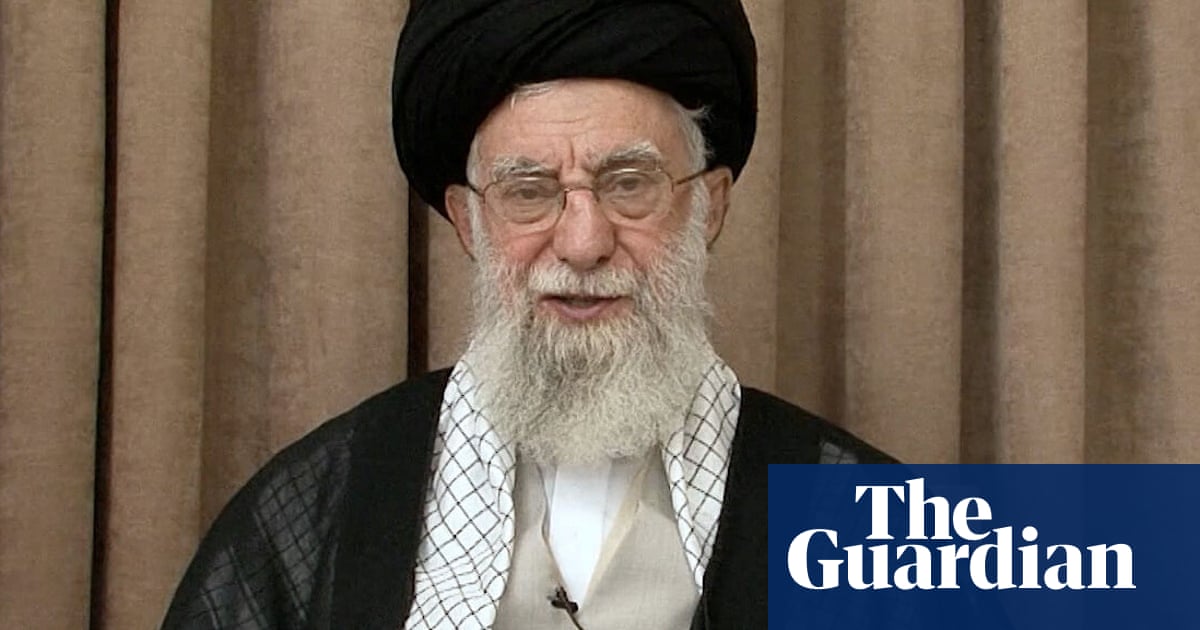Iran’s supreme leader,Ayatollah Ali Khamenei, has threatened to respond to any future US attack by striking American military bases in the Middle East, in his first public comments since a ceasefire with Israel was declared.
The 86-year-old, who has not been seen in public since taking shelter in a secret location after the outbreak of the war on 13 June, said his country had “delivered a slap to America’s face” – a reference to an Iranian missile attack on a US base in Qatar on Monday, which caused no casualties.
In pre-recorded remarks that were aired on state television, he hailed his country’s “victory” over Israel and vowed never to surrender to the US.
As was also the case with his last comments, released more than a week ago during the 12-day Israeli bombardment, he spoke from an undisclosed indoor location in front of a brown curtain, between an Iranian flag and a portrait of his predecessor Ruhollah Khomeini.
In a message to the Iranian people, he said Donald Trump’s demand for Iran’s unconditional surrender at the start of the conflict had revealed the US’s true agenda.
“The fact that the Islamic republic has access to important American centres in the region and can take action against them whenever it deems necessary is not a small incident, it is a major incident, and this incident can be repeated in the future if an attack is made,” he said. “America entered the war directly because it felt that if it did not, Israel would be completely destroyed. Here, too, the Islamic republic emerged victorious.”
Khamenei sought to downplay the impact of the US attack on Iran’s nuclear facilities, which he said had failed to achieve anything important, and he accused Trump of exaggerating the attack in an attempt to cover up the truth.
His interpretation of the war’s outcome – designed for a domestic audience – was predictably patriotic, but also suggested Iran’s battered leadership is not yet in the mood to move on from the hollowing out of its military leadership by Israel and the unprecedented US aerial attack on its nuclear sites.
It came against the backdrop of a row in the US over the extent of the damage inflicted by the American strikes.
On Thursday, Iran’s Guardian Council, a body empowered to vet legislation, approved a bill passed near unanimously by parliament 24 hours earlier suspending all cooperation with the UN’s nuclear inspectorate, the IAEA.
Under the terms of the legislation, cooperation will be restored only when two bodies – Iran’s atomic energy authority and the supreme national security council – notify parliament that conditions have been met, including a guarantee that its nuclear facilities are safe, and recognised as peaceful.
Steve Witkoff, a US special envoy, has said he is willing to resume talks on the future of cooperation with Iran in Oman next week, but so far Iran has not confirmed it will attend.
Iranian officials need time to assess whether they will be negotiating to retain a completely theoretical right to enrich uranium, since it no longer has the enrichment capability, or whether in fact the facilities survived the joint US-Israeli assault and could be revived.
In an interview with Al Jazeera, a foreign ministry spokesperson, Esmail Baghaei, repeatedly avoided describing the state of the country’s nuclear programme, before saying: “Our nuclear facilities have been severely damaged, that is certain.”
He admitted a debate was under way over whether the country should leave the nuclear non-proliferation treaty, since it had not provided the intended protections. Iran, whose defence minister, Aziz Nasirzadeh, is on a visit to China, remains furious that so few western nations have said the Israeli attack was in breach of international law and cannot be justified as an act of self-defence under the UN charter.
Trump has announced he is lifting some US sanctions to allow Iran to increase exports to China, a goodwill gesture.
Khamenei made no reference to the possible restart of talks and instead accused Trump of revealing that his real objective had been Iran’s surrender, something he vowed would never happen.
Sébastien Lecornu, France’s defence minister, told the French parliament that the French military participated in intercepting drones launched by Iran toward Israel before the ceasefire was established.
Lecornu said on Wednesday: “I confirm that the French military, using ground-to-air systems or Rafale fighter jets, intercepted fewer than 10 drones during various military operations by the Islamic Republic of Iran against Israel.”
He claimed Iran launched approximately 400 ballistic missiles and 1,000 drones toward Israel over 12 days.
